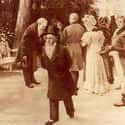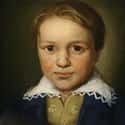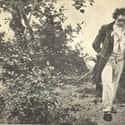-
(#14) His Disdain For Authority And Pretense Ruined His View Of A Literary Hero
Beethoven was naturally predisposed to resisting authority. Like many of his generation, he was ideologically influenced by the French Revolution. He hated being told what to do and disdained all forms of social pretense or hierarchy. If asked to perform at a social gathering, he would resolutely refuse and, in some cases, storm out. His refusal to follow the norms of bourgeoisie and aristocratic etiquette was so profound, Archduke Rudolph, a patron of the arts and supporter of Beethoven, exempted him from the rules of the court.
This stubbornness also applied to Beethoven's conception of himself as an artist, and his ideas of the role of the artist in society. In his mind, the artist stood apart from all others, a special class of people endowed with special gifts. He dubbed himself a Tondichter ("poet of sound") and accorded the same respect and status to fellow artists. His image of artists worked against him in some instances, though. When Beethoven met Johann Wolfgang von Goethe, who he esteemed as the greatest of poets, he was disturbed to see the writer behaving deferentially with royals. This ruined his conception of Goethe.
-
(#18) Almost 100 Years After Beethoven's Death, German POWs Brought His Music to Japan
Not a sad fact from the life of Beethoven, but strange enough to merit mentioning, is the way in which the composer became a cultural staple in Japan.
Japan wasn't exposed to any Western classical music until the end of the 19th century, and Beethoven's music didn't make there until WWI. Japan, siding with Britain and the Allies in that war, demanded Germany surrender a base in Qingdao, China, a port city on the Yellow Sea. Germany refused, so the Japanese seized it, capturing 4,000 POWs.
A thousand of these Germans were sent to Naruto, Japan, where they spent their time as productively as possible. A group of them formed an orchestra and performed various pieces, with a focus on Beethoven. On June 1, 1918 the orchestra publicly performed Beethoven's Ninth for the first time on the continent of Asia. Since that first performance, the piece has achieved such stature in Japan it is considered an iconic and indelible part of Japanese culture, despite being German.
It is now a tradition for Japanese orchestras to play the Ninth at some point in December. There are several explanations for this, one being musicians face financial difficulties at year end and know a performance of the Ninth will sell out. Unique to the Japanese tradition, the audience frequently sings the "Ode to Joy" chorale in German along with the choir Typically, Beethoven's Ninth will be performed hundreds of times in December by orchestras all across Japan, with many playing its final note as the New Year begins.
-
(#2) His Tutor, Tobias Pfeiffer, Was A Weirdo Who Made Him Practice In The Middle Of The Night
In 1779, when Beethoven was nine years, an eccentric musician named Tobias Friedrich Pfeiffer moved into the Beethoven household. Pfeiffer had recently moved to Bonn and befriended Ludwig's father, who thought Ludwig could benefit from Pfeiffer's tutelage.
Pfeiffer taught Beethoven for one year, during which time he recognized Ludwig's talent and helped him improve greatly as a musician. However, he was apparently a very disagreeable man with a habit of forcing Ludwig to practice at strange hours. According to some sources, Pfeiffer was an insomniac, and would drag Beethoven out of bed in the middle of the night for lessons.
Beethoven biographer Tilman Skowroneck argues Pfeiffer was a positive influence on Ludwig the musician and composer, despite the negative effects he had on the young boy's psyche. According to primary sources Skowroneck cites, Pfeiffer was a gifted musician and the primary source of Beethoven's formal musical education as a child.
-
(#1) His Alcoholic Father Abused And Berated Him In An Attempt To Make Him The Next Mozart
Beethoven was born on December 16, 1770 in Bonn, present day Germany. His grandfather, also named Ludwig van Beethoven, was a kapellmeister (conductor) and Bonn's most respected musician. Unfortunately, Beethoven's father, Johann, was an abusive alcoholic intent on turning his son into a musical prodigy akin to Mozart.
Legend has it, as a very small child, Beethoven was forced to stand on a stool so he could reach the piano keyboard. His father routinely beat and whipped him for mistakes or lack of attentiveness. Johann arranged a public recital for his son on March 26, 1778, billing him as six years old when Ludwig was seven. Though a competent musician, Beethoven never received the same early acclaim as Mozart, which frustrated his father to no end.
-
(#16) He Was A Heavy Drinker And Died In Agony, But No One's 100% Sure About What Killed Him
Beethoven's maternal grandmother and father were alcoholics, so it's not surprising his autopsy showed he died from cirrhosis of the liver. In his final days, he suffered from ascites, an accumulation of fluid in the abdominal cavity, a result of cirrhosis that causes gross swelling. Yet cirrhosis has numerous causes, so which one did Ludwig have?
As an adult, Beethoven drank every day, concluding each evening with a trip to the local tavern. Among other beverages, he drank a lot of wine, which at the time was laced with lead to provide cheap product with a better taste (the practice was illegal even then, but still widespread). Beethoven's chronic drunkenness probably explained his mood swings, hostility, and depression. Coincidentally, his nephew, Karl, also died at a young age from liver-related complications.
Of course, not everyone agrees with the death-by-alcoholism diagnosis. According to a New York Times article from 2010, while Beethoven was certainly ill and suffering from liver problems, there has yet to appear irrefutable evidence of his exact cause of death.
-
(#8) He Never Married, But Not For Lack Of Trying
Ludwig van Beethoven never married. He proposed marriage to several women, though was rejected by all of them. Among other reasons for these rejections was his physical appearance. Countess Julia Guicciardi, a piano pupil in her teens and the object of the Sonata No. 14 in C-Sharp Minor (Moonlight), described Beethoven as "very ugly, but noble..." Yeah, sure, musical genius. But dag, so fugly.
Of course, looks aren't everything. Beethoven was also arrogant and unpleasant. In 1810, he was romancing Therese Malfatti, long-rumored to be the inspiration for Beethoven's Bagatelle No. 25 in A minor (Fur Elise). As things heated up between them, Beethoven contemplated a marriage proposal, but was banned from the Malfatti household for offending everyone in it.
There also was the matter of social class. Beethoven circulated in high society, so he was exposed to woman with titles and wealth. Even though he achieved great success, he was a musician and, therefore, in the early 19th century, still thought of as a veritable servant.
New Random Displays Display All By Ranking
About This Tool
Beethoven has been away for more than 200 years, almost everyone in the world knows his name and music. All the modern musicians are still fascinated by his beautiful music and touching melody, but few people know how tragic his life has been. Beethoven spent his childhood under the strict and demanding education of his father, which created his stubborn, sensitive personality. When his music career began to develop, he was hit by fate again, he was deaf.
He has almost never heard of his own work. After his deafness, he tried his best to avoid any social activities. If a musician cannot hear his own work, what could be more cruel torture? The random tool shares 18 sad facts about the miserable life of Beethoven.
Our data comes from Ranker, If you want to participate in the ranking of items displayed on this page, please click here.
















